Q&A with National Team Member Kendyl Stewart on Bouncing Back
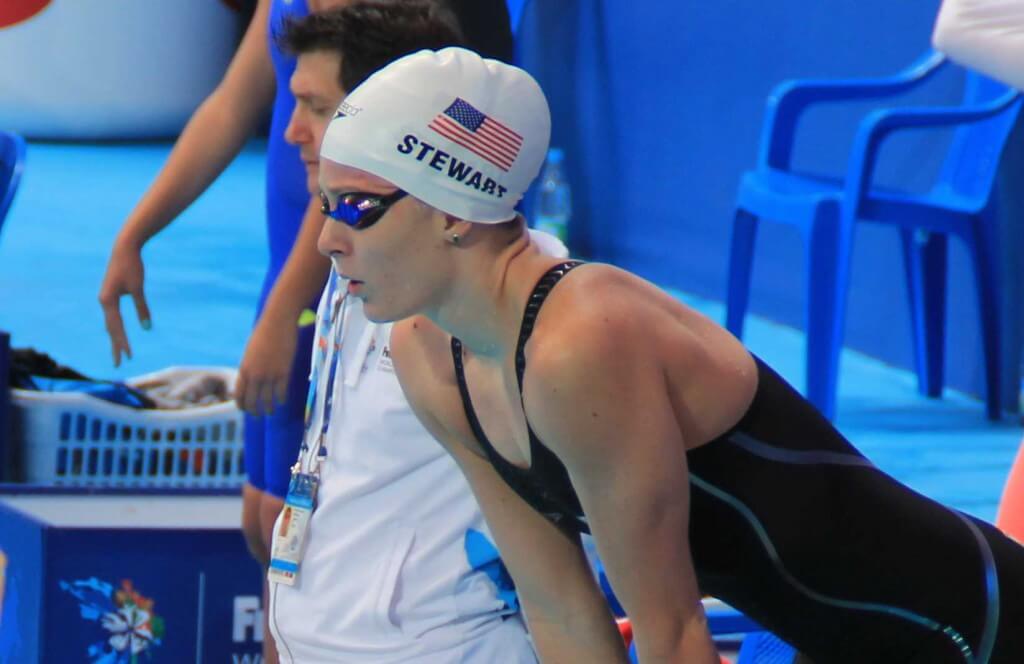
By Kate Santilena, Swimming World College Intern.
The sport of swimming does not come without its challenges. As swimmers, we face setbacks, plateaus, and disappointments all throughout our careers. The tricky but crucial component to longevity in the sport is how we bounce back from these difficulties and move forward.
What is possibly the most painful disappointment in our sport? Everyone has their own answer, but some would say making it in the finals at the Olympic Trials and placing third. How does one come back from a misfortune like that?
It is possible, and U.S. National Team member Kendyl Stewart surpassed that particular obstacle swimmingly. Here are some answers on how Stewart faced and overcame some tough challenges throughout her swimming career.
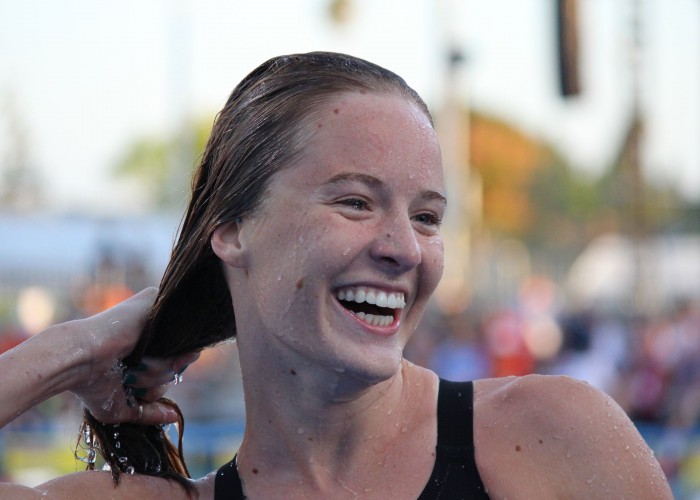
Photo Courtesy: Griffin Scott
Swimming World: After competing in the 2016 Olympic Trials and placing third in the 100 meter butterfly, what was your initial reaction?
Stewart: On the day of the race and in the following weeks, I kept a positive attitude. I knew that I had given my best on that day and that other swimmers placing ahead of me was out of my control. I wished I had swum a best time, but other than that, I had no regrets. I still am proud of my third place finish in 2016, but continuing my career with laser focus and preparing for 2020 Trials with the same veracity has been a journey. It has taken a while to figure out how to reconcile being “okay” with just missing the team in 2016 and also continuing to prioritize swimming in the Olympics in 2020. I had a rough couple of years of racing but feel I’m totally in the right place to get after it now.
SW: What were some of the things you did that helped you bounce back from that particular setback?
Stewart: Time spent with family and friends and time away from the pool. I attribute my longevity in the sport to living a balanced life. Ultimately, swimming is just one part of who I am as a person. When I place too much emphasis on my results in the pool, I quickly lose my love of the sport and become unhappy in other areas of my life as well.
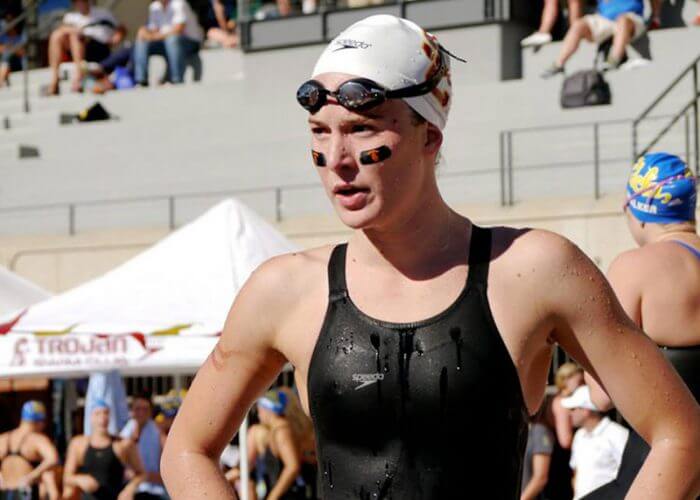
Photo Courtesy: Stephan Stumpf
SW: Now as a professional athlete, what are some of the things you have had to adapt to compared to when you were a club or collegiate swimmer?
Stewart: Ultimately, it is all up to me now. There is no university backing me or group of 30 girls who are scoring points for the same NCAA trophy. I consider myself an independent person, so I enjoy having freedom to travel and be on my own schedule. However, it did take me a while to adapt from having every minute of my day planned out for me to understanding and making decisions on what is best for me personally, as a professional. For me, it is a balance between knowing what works for me and honoring what I need to do to make myself a better athlete – and also knowing when to ask for help when I need it.
SW: What are some of the differences in training you are currently receiving on Team Elite compared to Trojan Swim Club?
Stewart: The change in both environment and training have elevated my swimming performance and love of the sport recently. I have heard that you should incorporate ten percent change every year into your training to continue to progress, and I had been about six years in the same groove. My time at the University of Southern California (USC) is the most treasured of my life, but it was just time for something fresh. I have been swimming a lot more with Team Elite – more sessions in a week, and more meters in a session. USC and Trojan Swim Club trains all fast all the time – I would say up to 90 percent of every workout is at top speed. With Team Elite, I’m re-developing my aerobic capacity and also getting some new takes on technical help.
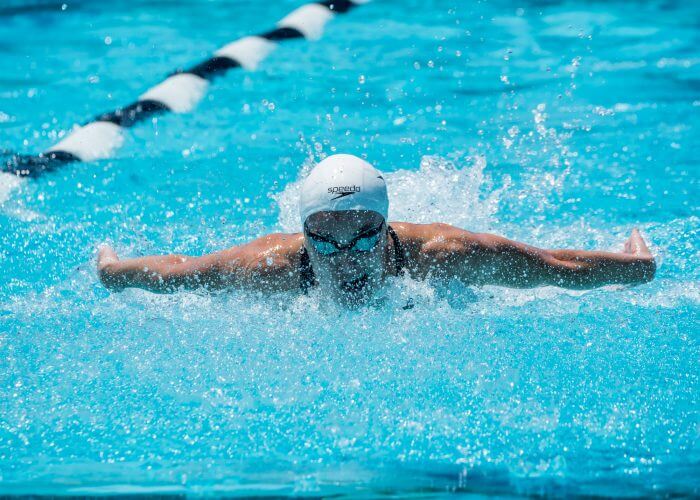
Photo Courtesy: Peter H. Bick
SW: What are some things you are looking forward to in the upcoming 2020 Olympic Trials?
Stewart: I am really excited about my new training environment and truly feel like I’m going to be faster than ever. It’s so great to be home in San Diego and to have such an amazing group of athletes to swim with. I am just feeling like the next 18 months are gonna be really good.
SW: What are some helpful tips you can give to younger swimmers who might be experiencing or have experienced some disappointments or setbacks in their swimming career?
Stewart: If you love it, stick with it! I went between 2011 to 2014 and 2014 to 2018 with no best times in the 100 meter butterfly. I always enjoyed being in the water, doing something that is good for my body and spending time with my best friends, even if I was not swimming faster than ever. Also, honor when you may need to spend some time away from the pool. Whenever I start to dread heading to practice or do not have clear goals in mind, I am never shy to take some time off. Mental fitness is just as important as physical fitness in my opinion.
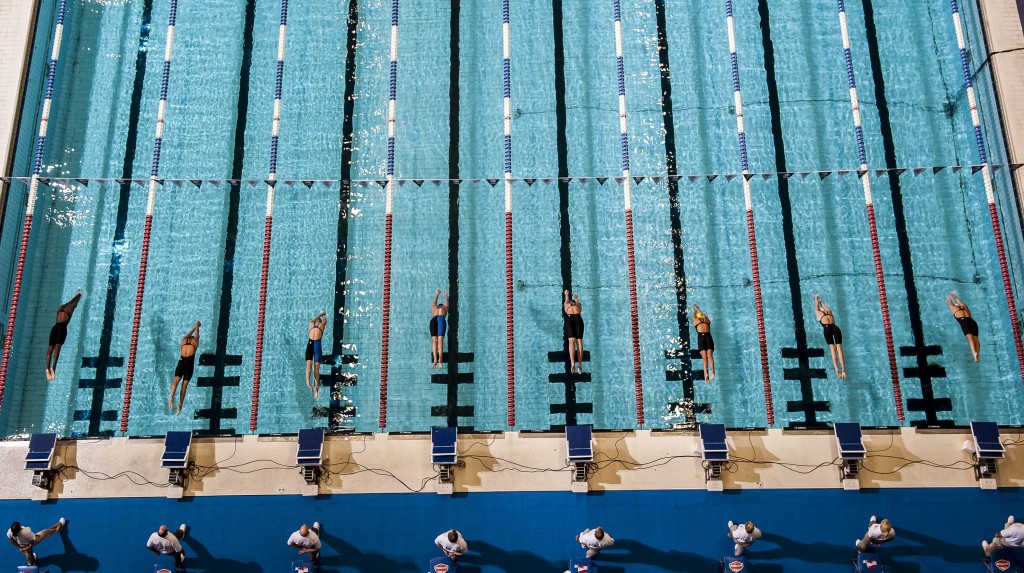
Photo Courtesy: Peter H. Bick
Ultimately, every swimmer, even professional swimmers, will experience some sort of disappointment along the path of their swimming career. How well a swimmer accepts, moves past, and attacks future races and practices separate the good from the great.
All interviews are conducted by the author and do not necessarily reflect the views of Swimming World Magazine nor its staff.



